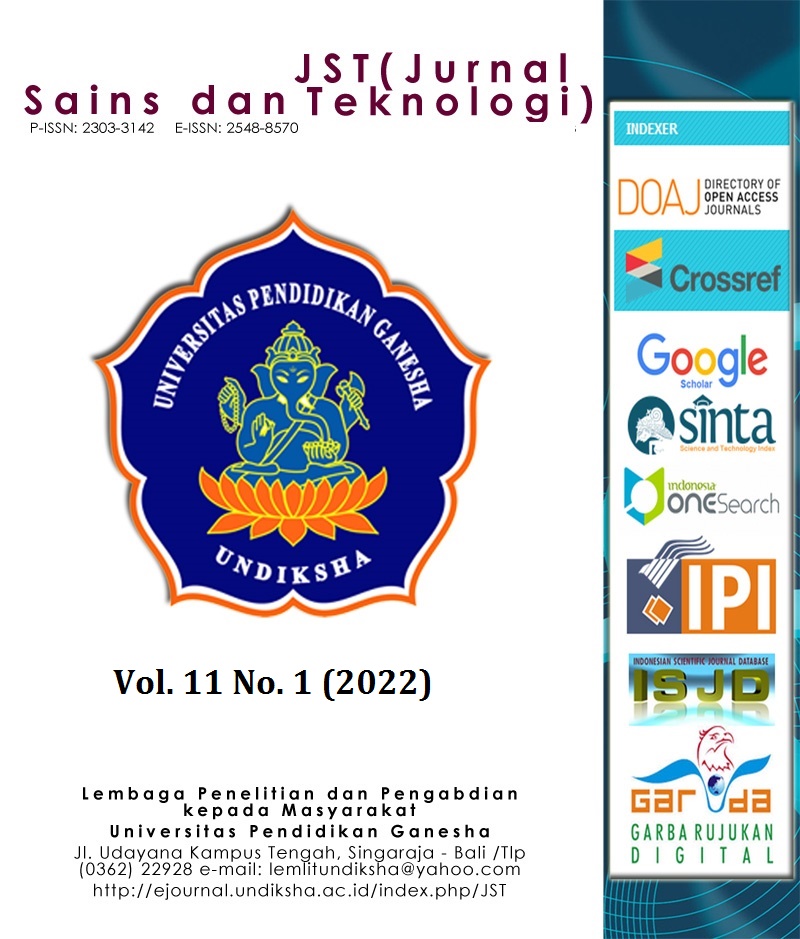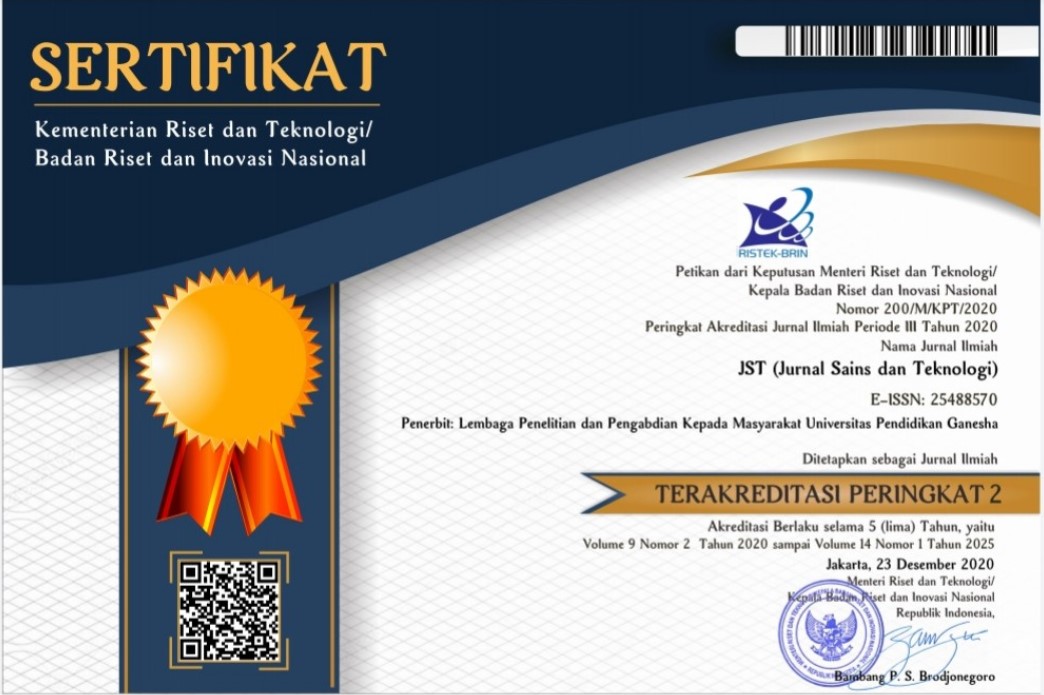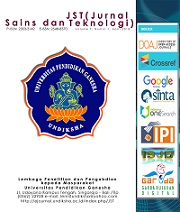Isolasi Bakteri Endofit dari Tanaman Laban (Vitex Pubescens Vahl) sebagai Antibakteri
DOI:
https://doi.org/10.23887/jstundiksha.v11i1.42781Abstrak
Pemanfaatan bakteri endofit sebagai penghasil senyawa metabolit sekunder sangat menguntungkan. Kandungan metabolit sekunder yang terdapat di dalam jaringan tumbuhan serta dalam bakteri merupakan potensi yang memberikan banyak manfaat dalam bidang pertanian. Penelitian ini bertujuan untuk mengisolasi bakteri endofit dari daun dan kulit batang tanaman Laban (Vitex pubescens Vahl) dan uji antibakteri. Bakteri diisolasi menggunakan media HVA. Karakteristik bakteri endofit diamati secara makroskopis, mikroskopis, dan melakukan uji katalase serta untuk uji antibakteri menggunakan bakteri patogen Erwinia carotrova. Jumlah isolat endofit yang berhasil diisolasi berjumlah delapan isolat (empat isolat dari daun laban dan empat isolat dari kulit batang laban). Karakterisasi dilakukan pada delapan isolat endofit yang dihasilkan bahwa isolat memiliki ciri-ciri yang berbeda baik secara makroskopis, mikroskopis, dan semua isolat endofit dari tanaman laban menghasilkan enzim katalase (uji +). Hasil aktivitas antibakteri menunjukkan tujuh isolat bakteri endofit memiliki aktivitas antibakteri terhadap erwinia carotrovora. Tanaman laban kaya akan keragaman bakteri endofit. Isolate bakteri endofit terisolasi 8 spesies yang berbeda (DA45, DA46, DB15, DB16, KBC1, KBC2, KBC3 dan KBC4). Bakteri endofit yang berasosiasi dengan tanaman berperan penting dalam kesehatan tanaman.
Referensi
Astuti, F., Cahyono, E., Supartono, S., Van, N., & Duong, N. (2018). Effectiveness Of Elements Periodic Table Interactive Multimedia in Nguyen Tat Thanh High School. International Journal of Indonesian Education and Teaching, 2(1), 1–10. https://doi.org/10.24071/ijiet.2018.020101.
Castronovo, L. M., Vassallo, A., Mengoni, A., Miceli, E., Bogani, P., Firenzuoli, F., Fani, R., & Maggini, V. (2021). Medicinal Plants and Their Bacterial Microbiota: A Review on Antimicrobial Compounds Production for Plant and Human Health. Pathogens (Basel, Switzerland), 10(2), 106. https://doi.org/10.3390/pathogens10020106.
Eljounaidi, K., K, L. S., & H, B. (2016). Bacterial Endophytes as Potential Biocontrol Agents of Vascular wilt Diseases-Review and Future Prospects. Biological Control, 103, 62–68. https://doi.org/10.1016/j.biocontrol.2016.07.013.
Erjaee, Z., Shekarforoush, S. S., & Hosseinzadeh, S. (2019). Identification of Endophytic Bacteria in Medicinal Plants and Their Antifungal Activities Against Food Spoilage Fungi. Journal of Food Science and Technology, 56(12), 5262–5270. https://doi.org/10.1007/s13197-019-03995-0.
Fajri, M. ., & Agustien, A., & P. (2015). Isolasi, Karakterisasi dan Potensi Bakteri Endofitik dari Tanaman Zodia (Evodia suaveolens Scheff) sebagai Penghasil Antibiotika. Jurnal Biologi Universitas Andalas, 4(2), 100–106. https://doi.org/10.29303/jbt.v22i1.3104.
G, S., A, D., N, P. L., & O, R. S. (2018). Genomic Insights into Nematicidal Activity of A Bacterial Endophyte, Raoultella Ornithinolytica MG Against Pine wilt Nematode. The Plant Pathology Journal, 34(3), 250–255. https://doi.org/10.5423/PPJ.OA.10.2017.0217.
Hermansah, A., Harlia, & Zahara, T. . (2015). Skrining Fitokimia dan Uji Aktivitas Antioksidan Ekstrak Kulit Batang Laban (Vitex pubescens Vahl). JKK, 4(2), 67–71. https://jurnal.untan.ac.id/index.php/jkkmipa/article/view/11735.
Jasim, B., A, J. A., J, J. C., J, M., & K., R. E. (2014). Isolation and Characterization of Plant Growth Promoting Endophytic Bacteria from The Rhizome of Zingiber Officinale. Biotech, 4(2), 197–204. https://doi.org/10.1007/s13205-013-0143-3.
Kandel, S. L., Joubert, P. M., & Doty, S. L. (2017). Bacterial Endophyte Colonization and Distribution within Plants. Microorganisms, 5(4), 77. https://doi.org/10.3390/microorganisms5040077.
Khan, M., Gao, J., Chen, X., Zhang, M., Yang, F., Du, Y., Moe, T., Munir, I., Xue, J., & Zhang, X. (2020). The Endophytic Bacteria Bacillus Velezensis Lle-9, Isolated from Lilium Leucanthum, Harbors Antifungal Activity and Plant Growth-Promoting Effects. Biotechnol, 30, 668–680. https://doi.org/10.4014/jmb.1910.10021.
Khare, E., Mishra, J., & Arora, N. K. (2018). Multifaceted Interactions Between Endophytes and Plant: Developments and Prospects. Frontiers in Microbiology, 9(2732). https://doi.org/10.3389/fmicb.2018.02732.
Kobayashy, D., & Palumbo, J. (2000). Bacterial Endophytes and Their Effects on Plants and Uses in Agriculture. (M. D. Inc (ed.)). Microbial endophytes. http://www.sciepub.com/reference/169761.
Kumar, A., Singh, R., Yadav, A., Giri, D. D., Singh, P. K., & Pandey, K. D. (2016). Isolation and Characterization of Bacterial Endophytes of Curcuma Longa L. 3 Biotech, 6(1), 60. https://doi.org/10.1007/s13205-016-0393-y.
Kurniawan, S. E., Mahyarudin, M., & Rialita, A. (2021). Aktivitas Antibakteri Isolat Bakteri Endofit Daun Pegagan (Centella Asiatica) terhadap Staphylococcus Aureus. Bioma: Jurnal Ilmiah Biologi, 10(1), 14–29. https://doi.org/10.26877/bioma.v10i1.7140.
Larasati, R. ., Kartika, I. R., & Dewi, F. . (2013). Profil Fitokimia dan Uji Aktivitas Antifungi Ekstrak Metanol Daun Laban (Vitex Pinnata L.) serta Fraksi-Fraksinya. JRSKT, 3(1), 271–279. http://journal.unj.ac.id/unj/index.php/jrskt/article/view/74.
Linda, T. M., Berlyansah, A., Fibriarti, B. L., Sofiyanti, N., & Devi, S. (2022). Isolation and Analysis of Bioactive Compounds Endophytic Bacteria of Sea Fern (Acrtostichum aureum L.) from Bengkalis Island, Riau. Jurnal Biologi Tropis, 22(1), 46–54. https://doi.org/10.29303/jbt.v22i1.3104.
Liu, H., Carvalhais, L. C., Crawford, M., Singh, E., Dennis, P. G., Pieterse, C., & Schenk, P. M. (2017). Inner Plant Values: Diversity, Colonization and Benefits from Endophytic Bacteria. Frontiers in Microbiology, 8, 2552. https://doi.org/10.3389/fmicb.2017.02552.
Liu, J. M., Wang, S. S., Zheng, X., Jin, N., Lu, J., Huang, Y. T., Fan, B., & Wang, F. Z. (2020). Antimicrobial Activity Against Phytopathogens and Inhibitory Activity on Solanine in Potatoes of the Endophytic Bacteria Isolated From Potato Tubers. Frontiers in Microbiology, 11, 570926. https://doi.org/10.3389/fmicb.2020.570926.
Liu, Q., Huang, J., & Zhou, Z. (2020). Self-expansion via Smartphone and Smartphone Addiction Tendency Among Adolescents: A Moderated Mediation Model. Children and Youth Services Review, 119(June), 105590. https://doi.org/10.1016/j.childyouth.2020.105590.
Martinez-Klimova, E., Rodríguez-Peña, K., & Sánchez, S. (2017). Endophytes as Sources of Antibiotics. Biochemical Pharmacology, 134, 1–17. https://doi.org/10.1016/j.bcp.2016.10.010.
Omomowo, O. I., & Babalola, O. O. (2019). Bacterial and Fungal Endophytes: Tiny Giants with Immense Beneficial Potential for Plant Growth and Sustainable Agricultural Productivity. Microorganisms, 7(11), 481. https://doi.org/10.3390/microorganisms7110481.
Purwaningsih, D., & Wulandari, D. (2021). Uji Aktivitas Antibakteri Hasil Fermentasi Bakteri Endofit Umbi Talas (Colocasia esculenta L) terhadap Bakteri Pseudomonas Aeruginosa : Potential of Antibacterial Compound Fermentation of Endophytic Bacteria from Taro Tuber (Colocasia esculenta L.) againt. Jurnal Sains Dan Kesehatan, 3(5), 750–759. https://doi.org/10.25026/jsk.v3i5.622.
Romero-Arguelles, R., Romo-Sáenz, C. I., Morán-Santibáñez, K., Tamez-Guerra, P., Quintanilla-Licea, R., Orozco-Flores, A. A. Ramírez-Villalobos, J. M., Tamez-Guerra, R., Rodríguez-Padilla, C., & Gomez-Flores, R. (2022). Activity of Endophytic and Rhizosphere Gram-Positive Bacteria from Ibervillea sonorae (S. Watson) Greene against L5178Y-R Lymphoma Cells. International Journal of Environmental Research and Public Health, 19(2), 894. https://doi.org/10.3390/ijerph19020894.
Rosenblueth, M., & Martínez-Romero, E. (2006). Bacterial Endophytes and Their Interactions with Hosts. Molecular Plant-Microbe Interactions, 18(8), 827–837. https://doi.org/10.1094/MPMI-19-0827.
Sadikin, N. A. N., Bintari, S. H., Widiatningrum, T., & Dewi, P. (2021). Isolasi, Karakterisasi, dan Uji Aktivitas Antibakteri dari Bakteri Endofit Daun Kelor (Moringa oleifera). Life Science, 10(2), 109–119. https://doi.org/10.15294/lifesci.v10i2.54441.
Salam, N., Khieu, T. ., Liu, M. ., Vu, T. ., Chu-Ky, S., Quach, N. ., Phi, Q. ., Narsing, R. M. ., Fontana, A., & Sarter, S. (2017). Endophytic Actinobacteria Associated with Dracaena Cochinchinensis Lour.: Isolation, Diversity, and Their Cytotoxic Activities. Biomed. 1308563. https://doi.org/10.1155/2017/1308563.
Salo, E. N., & Novero, A. (2020). Identification and Characterisation of Endophytic Bacteria from Coconut (Cocos Nucifera) Tissue Culture. Tropical Life Sciences Research, 31(1), 57–68. https://doi.org/10.21315/tlsr2020.31.1.4.
Santoyo, G., Moreno-Hagelsieb, G., del Carmen Orozco-Mosqueda, M., & Glick, B. R. (2016). Plant Growth-Promoting Bacterial Endophytes. Microbiological Research, 183, 92–99. https://doi.org/10.1016/j.micres.2015.11.008.
Sebola, T. E., Okereafor, N. C. U., Tapfuma, K. I., Mekuto, L., Green, E., & Mavumengwana, V. (2019). Evaluating Antibacterial and Anticancer Activity of Crude Extracts of Bacterial Endophytes from Crinum Macowanii Baker Bulbs. MicrobiologyOpen, 8(12), 1–10. https://doi.org/10.1002/mbo3.914.e914.
Shurigin, V., Alaylar, B., Davranov, K., Wirth, S., Bellingrath-Kimura, S. D., & Egamberdieva, D. (2021). Diversity and Biological Activity of Culturable Endophytic Bacteria Associated with Marigold (Calendula Officinalis L.). AIMS Microbiology, 7(3), 336– 353. https://doi.org/10.3934/microbiol.2021021.
Sidauruk, S. W., Sari, N. I., Diharmi, A., & Arif, I. (2021). Aktivitas Antibakteri Ekstrak Sargassum Plagyophyllum terhadap Bakteri Listeria Monocytogenes dan Pseudomonas Aeruginosa. Jurnal Pengolahan Hasil Perikanan Indonesia, 24(1), 27–37. https://doi.org/10.17844/jphpi.v24i1.33417.
Zulkifli, L., Soelistya, D., & Bahri, S. (2018). Isolasi, Karakterisasi, dan Identifikasi Bakteri Endofit Kulit Batang Srikaya (Annona Squamosa) dan Potensinya sebagai Antibakteri. Jurnal Penelitian Pendidikan IPA, 4(1), 21–29. https://doi.org/10.29303/jppipa.v4i1.98.
Unduhan
Diterbitkan
Cara Mengutip
Terbitan
Bagian
Lisensi
Hak Cipta (c) 2022 JST (Jurnal Sains dan Teknologi)

Artikel ini berlisensiCreative Commons Attribution-ShareAlike 4.0 International License.
Authors who publish with the Jurnal Sains dan Teknologi (JST) agree to the following terms:
- Authors retain copyright and grant the journal the right of first publication with the work simultaneously licensed under a Creative Commons Attribution License (CC BY-SA 4.0) that allows others to share the work with an acknowledgment of the work's authorship and initial publication in this journal.
- Authors are able to enter into separate, additional contractual arrangements for the non-exclusive distribution of the journal's published version of the work (e.g., post it to an institutional repository or publish it in a book), with an acknowledgment of its initial publication in this journal.
- Authors are permitted and encouraged to post their work online (e.g., in institutional repositories or on their website) prior to and during the submission process, as it can lead to productive exchanges, as well as earlier and greater citation of published work. (See The Effect of Open Access)
















